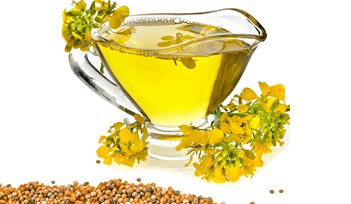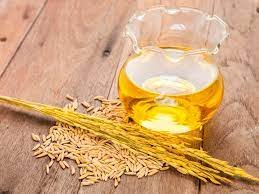

Mustard Oil
Mustard oil is a fatty vegetable oil extracted from the mustard seeds. It is dark yellow in color and slightly pungent. There are generally three types of mustard oils depending upon the manner of extraction. The first is a fatty vegetable oil obtained by pressing the mustard seeds.

Canola Oil
anola refers to both an edible oil (also known as canola oil) produced from the seed of any of several varieties of the Brassicaceae family of plants, and to those plants, namely a cultivar of Brassica napus L., Brassica rapa subsp. oleifera, syn. B. campestris L. or Brassica juncea. To be called canola, it must contain less than 2% erucic acid and less than 30 micromoles glucosinolates.

Soyabean Oil
Soybean oil is widely used oil and is commonly called "vegetable oil". Soybean oil is a very healthy food ingredient despite the bad publicity regarding fats and oils in general. Soybean oil is very popular because it is cheap, healthful and has a high smoke point. Soybean oil does not contain much saturated fat. Like all other oils from vegetable origin, soybean oil contains no cholesterol.

Kachchi Ghani Mustard Oil
Kachchi Ghani mustard oil is also known as raw grade and is obtained by a process of cold pressing chain of clean and sound mustard seeds of species like Brassica campestris linn (yellow or brown) brassica juncea linn (lahi, rai or laha) or brassica napus (rape or toria) or a mixture of them. Kachchi Ghani mustard oil is rich in presence of natural essential oil (allyl isothiocyanate) as it is extracted through cold pressing processes which retains the natural properties of mustard in end product and gives positive health impacts.

Cotton Seed Oil
Cottonseed oil is a cooking oil extracted from the seeds of cotton plants of various species, mainly Gossypium hirsutum and Gossypium herbaceum, that are grown for cotton fiber, animal feed, and oil. Cotton seed has a similar structure to other oilseeds such as sunflower seed, having an oil-bearing kernel surrounded by a hard outer hull; in processing, the oil is extracted from the kernel. Cottonseed oil is used for salad oil, mayonnaise, salad dressing, and similar products because of its flavor stability.

Rice Bran Oil
Rice bran oil is popular in several countries such as Japan, India, Korea, China and Indonesia as cooking oil. It has been shown that RBO is an excellent cooking and salad oil due to its high smoke point and for its delicate flavor. RBO research shows it may reduce cholesterol and cardiovascular diseases. The nutritional qualities and health effects of rice bran oil are discussed below, and are compared with other commonly used coking oils.

Palm Olein Oil
Palm Olein Oil (also known as dendê oil, from Portuguese) is an edible vegetable oil derived from the mesocarp (reddish pulp) of the fruit of the oil palms, primarily the African oil palm Elaeis guineensis, and to a lesser extent from the American oil palm Elaeis oleifera and the maripa palm Attalea maripa. Palm Olein Oil is naturally reddish in color because of a high beta-carotene content. It is not to be confused with palm kernel oil derived from the kernel of the same fruit, or coconut oil derived from the kernel of the coconut palm (Cocos nucifera). The differences are in color (raw palm kernel oil lacks carotenoids and is not red), and in saturated fat content: Palm mesocarp oil is 41% saturated, while palm kernel oil and coconut oil are 81% and 86% saturated respectively.

Groundnut oil
Groundnut oil, also known as peanut oil or arachis oil, is a mild-tasting vegetable oil derived from peanuts. The oil is available with a strong peanut flavor and aroma, analogous to sesame oil.

castor oil
astor oil is a vegetable oil obtained by pressing the seeds of the castor oil plant (Ricinus communis). The common name "castor oil", from which the plant gets its name, probably comes from its use as a replacement for castoreum, a perfume base made from the dried perineal glands of the beaver (castor in Latin). Castor oil is a colorless to very pale yellow liquid with a distinct taste and odor once first ingested. Its boiling point is 313 °C (595 °F) and its density is 961 kg/m3. It is a triglyceride in which approximately 90 percent of fatty acid chains are ricinoleate. Oleate and linoleates are the other significant components.

SUNFLOWER CRUDE OIL
Sunflower oil is the non-volatile oil pressed from the seeds of sunflower (Helianthus annuus). Sunflower oil is commonly used in food as a frying oil, and in cosmetic formulations as an emollient. The world's total production of sunflower oil in 2014 was nearly 16 million tonnes, with Ukraine and Russia as the largest producers.

CRUDE PALM OIL
Crude Palm oil is an edible vegetable oil derived from the mesocarp (reddish pulp) of the fruit of the oil palms, primarily the African oil palm Elaeis guineensis, and to a lesser extent from the American oil palm Elaeis oleifera and the maripa palm Attalea maripa.